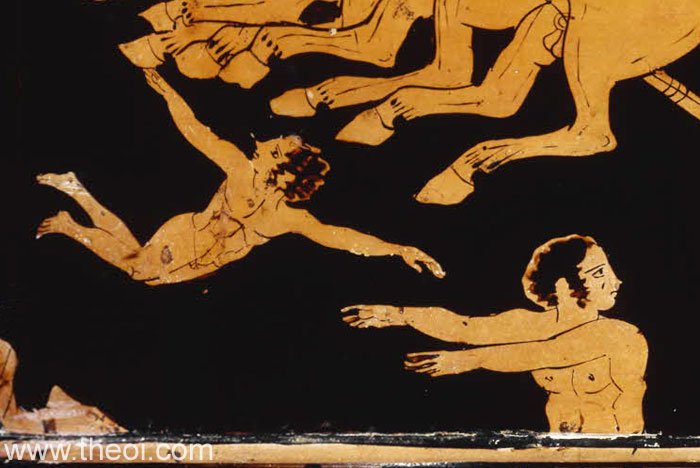STILBON
Greek Name
Στιλβων
Transliteration
Stilbôn
Latin Spelling
Stilbon
Translation
Gleaming, Glittering

STILBON was the god of the wandering star (aster planetos) Hermaon, the planet Mercury. His name was derived from the Greek verb stilbô meaning "to gleam" or "glitter." Of the five planets, he was the least personified. The star belonged to Hermes, herald of the gods.
FAMILY OF STILBON
PARENTS
ASTRAIOS & EOS (parents of the Astra, presumably Pyroeis) (Hesiod Theogony 378, Apollodorus 1.8)
ALTERNATE NAMES
Greek Name
Αστηρ Ἡρμαων
Transliteration
Astêr Hêrmaôn
Latin Spelling
Aster Hermaon
Translation
Star of Hermes (Mercury)
CLASSICAL LITERATURE QUOTES
Hesiod, Theogony 378 ff (trans. Evelyn-White) (Greek epic C8th or C7th B.C.)
:
"And Eos (Dawn) bare to Astraios (Astraeus, the Starry) the strong-hearted Anemoi (Winds) . . . a goddess
mating in love with a god. And after these Erigenia [Eos] bare the star Eosphorus (Dawn-bringer), and the
gleaming Astra (Stars) with which heaven is crowned."
Pseudo-Apollodorus, Bibliotheca 1. 8 - 9 (trans. Aldrich) (Greek mythographer C2nd
A.D.) :
"The Titanes (Titans) had children . . . Eos and Astraios (Astraeus) were parents of Anemoi (Winds) and
Astra (Stars)."
Pseudo-Hyginus, Astronomica 2. 42 (trans. Grant) (Roman mythographer C2nd A.D.)
:
"Planets. It remains for us to speak of the five stars which many have called wandering, and which the
Greeks call Planeta (Planets). . .
This fifth star is Mercurius' [Hermes'], named Stilbon. It is small and bright. It is attributed to Mercurius
because he first established the months and perceived the courses of the constellations. Euhemerus [Greek writer
C4th-3rd B.C.] says that Venus [Aphrodite] first established the constellations and taught Mercurius
[Hermes]."
Cicero, De Natura Deorum 2. 20 (trans. Rackham) (Roman rhetorician C1st B.C.)
:
"Most marvellous [of all the stars of heaven] are the motions of the five Stars (Stellae), falsely called
planets or Wandering Stars (Stellae Errantes) . . .
Below this [the orbits of the stars Saturn, Jupiter and Mars] in turn is the Star (Stella) of Mercurius, called
by the Greeks Stilbon (the Gleaming), which completes the circuit of the zodiac in about the period of a year,
and is never distant from the sun more than the space of a single sign, though it sometimes precedes the sun and
sometimes follows it . . .
This regularity therefore in the Stars (Stellae), this exact punctuality throughout all eternity notwithstanding
the great variety of their courses, is to me incomprehensible without rational intelligence and purpose. And if
we observe these attributes in the Stars (Stellae), we cannot fail to enrol even them among the number of the
gods."
Nonnus, Dionysiaca 5. 67 ff (trans. Rouse) (Greek epic C5th A.D.) :
"He [Kadmos (Cadmus) founder of Thebes] dedicated the seven gates [of the new-founded city] to the seven
planets . . . The second gate he gave in honour to Hermaon [the planet Mercury], the shining neighbour of Mene
(the Moon)." [N.B. The seven "planets" were the five visible planets, the sun and the moon.]
SOURCES
GREEK
- Hesiod, Theogony - Greek Epic C8th - 7th B.C.
- Apollodorus, The Library - Greek Mythography C2nd A.D.
- Nonnus, Dionysiaca - Greek Epic C5th A.D.
ROMAN
- Hyginus, Astronomica - Latin Mythography C2nd A.D.
- Cicero, De Natura Deorum - Latin Rhetoric C1st B.C.
BIBLIOGRAPHY
A complete bibliography of the translations quoted on this page.